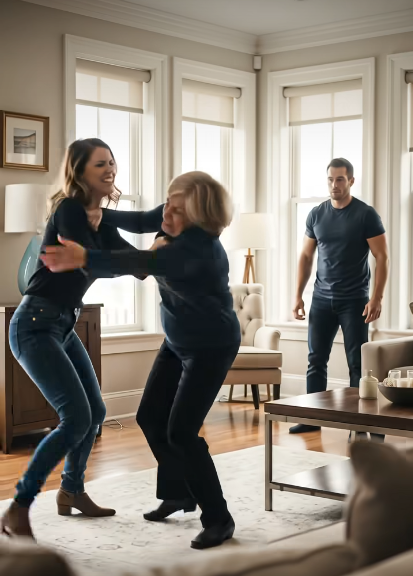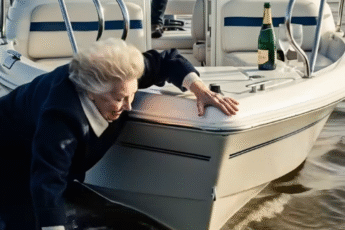My name is Linda Cooper. I am fifty-seven years old, and until that morning in March, I thought I understood the weight of sacrifice. I thought I knew where the line stood between helping your children and losing yourself in the process. But I was wrong. That morning changed everything.
I had just finished my first cup of coffee when my phone rang. The name on the screen made my stomach flip the same way it had for years: Rachel, my oldest child. She was the mother of two and the reason I had spent the last three years watching my own modest home in Tulsa fall apart while I poured every dollar into hers.
Rachel and her husband, Derek, had been denied a mortgage after his business folded. I couldn’t bear the thought of my grandchildren, eight-year-old Emma and five-year-old Caleb, growing up in crammed apartments as Rachel once did. I wanted them to have what I never could give her: space, safety, stability. So, I took money from my retirement account, borrowed against my own house, and bought them a four-bedroom colonial in Edmond. Every month, like clockwork, I sent $2,200 to cover the mortgage. On top of that came landscaping bills, roof repairs, and even the stainless-steel appliances Rachel insisted they “needed.”
“Hi, Mom.” Rachel’s voice sounded careful, practiced. “Can you come over today? We need to talk about something important.”
That phrase, we need to talk, never once in my life ended with good news. Still, I tried to convince myself otherwise as I reached for my keys. Maybe Derek had finally found a new job. Maybe they were ready to start paying their own way.
The drive up I-35 stretched long and empty, my thoughts bouncing between hope and dread. By the time I pulled into the driveway of that cream-colored house with the white fence, my chest felt heavy. It was beautiful, no denying it. But every blade of manicured grass had been paid for with my sacrifices. I told myself this meeting might finally be the moment they would show me gratitude. I could not have been more wrong.
Derek opened the front door before I had a chance to knock. His smile was thin, forced. “Linda, come in.”
The living room smelled faintly of lemon polish and candles. Rachel was already sitting on the gray sectional I had bought for them. Her hands were folded tightly in her lap, knuckles white.
“Where are the kids?” I asked, glancing toward the hallway.
“Upstairs,” Rachel replied, her tone clipped, business-like. “We wanted to talk without distractions.”
I sat in the armchair across from her. “All right,” I said, trying to keep my voice light. “What’s this about?”
Rachel drew in a breath. “Mom, we’ve been talking. Derek and I think it’s time for some changes. The way things are set up now… it doesn’t work for us anymore.”
My pulse quickened. “Changes? You mean about the payments? Are you ready to start taking them over?”
Her eyes hardened. Derek looked at the floor. “Not exactly,” she said. “What we want is for you to transfer the deed. Just sign the house over to us completely. No more payments from you, no more you being the owner. Just let us have it.”
The words landed like a slap. I stared at her, unable to speak. “Rachel,” I said finally, my voice trembling. “You’re asking me to give you a four-hundred-thousand-dollar house? Just… give it to you?”
“You’ve been paying anyway,” she shot back, her tone sharp. “It doesn’t really change anything for you. You’ll stop sending money you shouldn’t have been spending in the first place. You still have your pension, your own house.”
“I put my retirement savings into this place,” I whispered. “My security, my future. Without it, I have nothing.”
“That’s not our problem,” Rachel said flatly.
For the first time in years, I looked at my daughter and wondered if I knew her at all.
“Do you hear yourself?” I asked softly. “Do you think that’s fair?”
Rachel’s jaw clenched. “Fair?” she snapped. “You think it’s fair that Derek and I have to live under your shadow in a house that isn’t even ours on paper? Do you know how humiliating it is to tell people my mother owns my home?”
“I never wanted to humiliate you,” I said. “I wanted to protect you.”
Her laugh was sharp and bitter. “Stop pretending this is about us. This is about control. You like holding this over us, reminding us every month what you’ve done. Well, I am done. You either transfer the deed or…” She stopped, glaring at Derek as if daring him to disagree.
“Or what?” I asked, my voice steady now.
“Or you get out of our lives,” she said coldly. “Go away, Mom. We don’t need you anymore. We don’t need your guilt trips, your so-called help. Just leave.”
I stood too, my knees trembling. “Rachel,” I whispered. “This isn’t you.”
Something flickered in her eyes, but it wasn’t remorse. It was rage. She stepped forward and shoved me, hard, in the chest. My body lurched backward, colliding with the corner of the coffee table. Pain shot through my hip, and I gasped as I stumbled. Derek shouted, “Rachel, don’t!” but she shoved me again before he could stop her. This time, my head hit the hardwood floor with a sickening thud. Stars burst in my vision.
“Get out!” she screamed, standing over me, her face twisted into something I barely recognized. “Get out and don’t come back!”
I lay there, the ceiling spinning. The little girl who once begged me to chase monsters from her closet had just shoved me like I was one. Derek’s hands were under my arms, helping me up, his face pale. “Linda, are you okay? Rachel, what are you doing?”
But Rachel had already turned her back. I steadied myself, my body aching, my heart shattered into a million pieces. As I gathered my purse with shaking fingers, I said the only word left to say.
“Okay.”
The drive back to Tulsa was a blur. By the time I pulled into my driveway, the evening sky had turned the color of ash. Inside, I went straight to the bathroom. The woman in the mirror hardly looked like me. A dark bruise was blooming across my cheekbone, and I found dried blood tangled at the base of my scalp.
For years, I told myself Rachel’s sharp tone was stress, her demands temporary. But tonight, I saw her clearly. This wasn’t stress. This was entitlement. This was my daughter, believing she was owed everything I had, no matter the cost.
I sat at my kitchen table with a pad of paper and my laptop. Numbers don’t lie, even when hearts do. I began to tally what I had poured into that house. The down payment, the mortgage payments over three years, a new roof after the last hailstorm, the appliances, the landscaping, the furniture. The total hovered close to $140,000 of my savings, my retirement, my future.
My hands trembled as I searched for the number of the mortgage company. A calm voice answered. “My name is Linda Cooper,” I said, my voice shaking but firm. “I need to cancel the automatic payments for the property at 782 Willow Bend, Edmond.”
“Yes,” I whispered to the man on the phone. “I want to know what happens if I stop paying entirely.”
The answer was what I expected: default, then foreclosure. Unless, of course, I chose to sell. When I hung up, I stared at my reflection in the darkened window. For the first time in years, I felt something sharp and clean inside me. Not anger, not grief, but resolve. Rachel had told me to go away, and I would. But I would take her comfort with me.
The next morning, I woke with a dull ache in my hip, but my mind was clearer than it had been in years. I called Thomas Hayes, my old realtor.
“I’ve been better, Tom,” I said. “I need your help with a house in Edmond. It’s in my name. I want to sell it.”
There was a silence. He knew enough of my story to piece together the rest. “Linda, are you sure?”
I pressed my fingers to the bruise on my cheekbone, wincing. “She shoved me, Tom. Twice. I can’t keep enabling her. It’s not love anymore. It’s destruction.”
His voice lost its gentle tone, becoming firm and business-like. “Then we’ll do this right. The market in Edmond is hot. We’ll have buyers lined up within days.”
After we hung up, my phone buzzed with a text from Rachel: Mom, about yesterday. Stop being dramatic. You fell. No one hurt you. Can you just let it go?
I stared at the words, at the cold, blatant denial. My thumb hovered over the keyboard, but I didn’t reply. Some people only understood boundaries when consequences arrived.
Two days later, Tom sent me a photo: the cream-colored house, sunlight on the manicured lawn, and a bold red-and-white sign planted firmly in the yard. FOR SALE.
By mid-afternoon, the calls began. Rachel’s name lit up the screen again and again. The first voicemails were angry. “How dare you? This is our home!”
By evening, her tone shifted to pleading. “Mom, please, let’s talk. The kids need stability.”
By nightfall, they were frantic. “I’ll never forgive you if you do this!” Then, another: “You’ll never see Emma and Caleb again!”
That one cut deep. But I forced myself to remember the truth. Empty threats are the tools of the desperate.
On the third day, Derek showed up at my house. “Linda, please,” he said through the door. “She’s out of control. But can’t we find another way? The kids don’t deserve this.”
“I am sorry, Derek,” I called softly. “This was always going to happen. You both needed to learn.”
When my phone buzzed for the thirtieth time that day, I finally turned it off. For the first time in years, the silence felt like peace.
On the fifth day, I answered. “Hello, Rachel.”
“Mom,” she said, her voice softer than I expected. “We don’t have to do this. I know things got heated, but we can work something out. We’ll take over some of the payments. Doesn’t that sound fair?”
I closed my eyes, the old urge to rescue her pulling at me. But then I remembered the slam of my body against the table. “Before we talk about anything else,” I said slowly, “I want you to apologize for putting your hands on me.”
A pause. Then she scoffed. “Mom, you’re exaggerating. You tripped. You fell. Nobody got hurt.”
My hand tightened around the phone. “I have a bruise across my face and dried blood in my hair, Rachel. I got hurt. And you did it.”
“You’re being dramatic, as usual!” she snapped. “You always twist things to make yourself the victim!”
I felt something inside me harden into steel. “Rachel,” I said, my voice cold and steady. “Listen carefully. I will not be making another mortgage payment. Not this month, not next month, not ever again.”
“You can’t do this! What about the kids? Their home? Do you even care?”
Tears burned my eyes, but I forced them back. “I care more than you know. But stability built on lies and abuse isn’t real stability. You should have thought about Emma and Caleb before you shoved me to the ground.”
“Mom, please…” her voice grew frantic.
“This conversation is over,” I said, and pressed ‘end call.’ I didn’t feel guilty. I felt free.
Two weeks later, I sat in Tom Hayes’s office and signed the closing papers. The house sold faster than we expected, with three offers above asking price. The check from the sale cleared my debts, replenished my savings, and left me with a cushion that meant I would no longer live month-to-month. For the first time since retiring, I could breathe.
Rachel and Derek were forced to pack their lives into cardboard boxes and move in with his parents. For the first time in years, both of them had to work full-time. Rachel sent no apology, just silence. But through that silence, small voices reached me. Emma and Caleb’s drawings arrived in envelopes from Derek’s mother. Stick figures labeled “Grandma.” Hearts drawn in crayon. Messy words that spelled “We love you.” I pinned each one to my fridge, reminders that innocence still existed.
Back in Tulsa, I turned my attention to my own neglected home. The porch steps got repaired. Fresh paint brightened my kitchen. I planted flowers in the yard, not to impress anyone, but because I wanted to see them bloom. Every nail I hammered, every brushstroke I painted, felt like reclaiming a piece of myself.
I still love Rachel. I always will. But love is not the same as permission. For years, I believed that if I sacrificed enough, she would eventually see me. But sacrifice without gratitude only breeds entitlement. Selling that house wasn’t revenge. It was survival. It was the only way to teach my daughter a lesson she refused to hear: every choice has a cost, even when you think someone else will pay it for you. Generosity should never erase your dignity. You teach others how to treat you by what you allow. And sometimes, the greatest gift you can give is finally saying, “Enough.”





